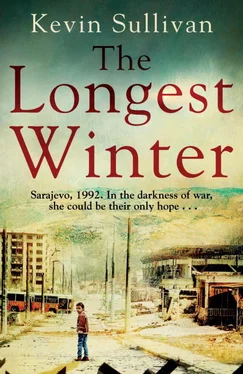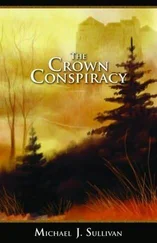Then they heard voices at a higher and more urgent pitch. A French officer was speaking to one of the Egyptian soldiers at the front door. Moments later, Alija, bearded, bespectacled and brisk, was escorted into the foyer.
Danby nodded to the escort, who withdrew, and Alija said, with unexpected force, ‘There is a problem on the Airport Road!’ He looked at Danby and then at Brad, then back at Danby.
There were snowflakes on Alija’s hair; he was breathless. He had been standing outside in the snow for ten minutes trying to persuade the Egyptian guards to let him in.
‘There are Rebels on the road… one of our ministers… inside a UN vehicle… there’s a stand-off!’
Danby rose. ‘I can make contact with the airport,’ he said.
Brad watched the Irishman take stock of Alija. For several seconds Danby stood still, and some of his calm transferred to Alija. Then he ushered the new arrival to a chair by the other table.
‘I’ll be back,’ Danby told Brad. Then, turning to Alija, ‘Give me a few minutes. I’ll find out what’s happening.’
He moved away quickly, the rolling, easy gait still evident, and climbed the stairs at the end of the foyer.
Brad walked over to the other table and sat down.
‘What’s happened?’
Chief of Cabinet in one of the ministries, Alija’s role and influence went well beyond the parameters of his actual position. He had access to ministers and members of the presidency and he used this to good effect. Alija had a knack for being in the right place at the right time, with the right documents in his leather music case and the right phone numbers etched in tiny well-formed characters on the rice paper of his old-fashioned address book.
‘The minister was travelling from the airport in a French APC,’ he told Brad. ‘The Rebels have a roadblock up. They’re holding the APC. That’s all we know. I came here to find out more.’
He paused, and then, ‘Have you heard anything about this?’
Brad shook his head. ‘Why was he on the road?’
‘There was a foreign delegation that couldn’t come into the city because of the shelling, so the minister went to meet them at the airport.’
‘How many Rebels?’
‘We only know there’s a roadblock.’
‘There is indeed a roadblock!’ said a smartly uniformed officer descending the stairs from the situation room. He advanced confidently across the foyer and shook hands with Alija and Brad. Alija’s arm moved mechanically in the officer’s grip.
Major Thomson was one of those people whose judgments are forthright and often wrong. He looked at the two men appraisingly: Alija was agitated; Brad seemed dissatisfied. In the major’s view, civilians were a hindrance: they made things harder for soldiers to fix.
‘We are resolving the matter now,’ he said. He spoke cheerily, his grey head tilted backward as though he was trying to keep Alija and Brad in focus. He had a thin, pointed, handsome face and a slightly too high voice. ‘Senior officers have been dispatched to the scene. The latest information we have is that the matter is close to a conclusion. The minister is unharmed.’
Alija sat down heavily. ‘When was your last information?’ he asked, collecting himself.
‘Moments ago.’
They sat in silence, and then Brad asked, ‘Do you know how many French soldiers are at the scene?’
Thomson took a short breath before he replied. He had noticed that you can never tell reporters enough. Answer one question, and they ask another.
‘Don’t know that,’ he said with sudden petulance. ‘Jim is finding out what he can.’
No one said anything, which Thomson found unsettling, so he said, ‘I’ll see what he’s come up with.’ He walked back across the room but then stopped. Danby was coming downstairs.
‘The situation is confused,’ Danby said, speaking principally to Alija. ‘There appears to have been shooting. We do not at this time know whether the shooting involved any of the French troops, or whether the APC carrying the minister was involved. My understanding is that the APC is still at the spot where it was stopped.’
Alija stood up again.
Danby raised his hands, palms outstretched. ‘I’m going to make every effort to find out exactly what’s happened over there,’ he said.
‘When did the shooting take place?’ Thomson asked. Five minutes earlier he had been told that all was well.
Danby looked irritated, which Thomson rather resented.
‘I have no information on that at this time,’ he said, again speaking principally to Alija. ‘But I would surmise in the last hour. I think rather than us getting into that sort of detail it would be best to wait till we have a better picture.’
Alija and his people at the presidency had no way of knowing what was happening on the Airport Road. The government’s forward lines were too far from the scene.
‘Can I speak to one of your officers? You have radio contact.’ Alija suggested.
‘That’s not possible.’ Danby registered the surprise in Alija’s expression and added quickly, ‘The thing is being dealt with from the PTT. I understand the General is already there.’
The pre-war telephone exchange, the PTT, was the main UN compound in the city.
Alija nodded. ‘Send news when you have details,’ he said. ‘I’ll try and reach our people at the PTT.’
He began walking towards the door. The other three watched him leave.
Brad said to Danby, ‘How many French troops are involved?’
‘I’ll get back to you on that just as soon as I can.’ Danby walked across the foyer and headed upstairs to the situation room.
Brad lit a cigarette.
‘This is a pickle,’ Thomson said. ‘Beats me why we let them travel to the airport anyhow.’
‘I guess it’s their country,’ Brad said.
Thomson disliked when journalists were pious. People are corrupt, he thought, and dishonest and selfish and when things get excessively bad there is apt to be violence. The solution is to be more efficiently violent than the other fellow. In an ideal world there wouldn’t be wars, but the world’s not ideal. ‘Look at the mess they’ve made of it,’ he said.
‘I’ll go to the presidency,’ Brad remarked after a short pause. He had been thrown a scoop. He had a sudden terror of doing nothing.
‘Let us know what you find out,’ Thomson said affably. He walked Brad to the door.
Outside, Brad waited impatiently for the Egyptian guard to unlock the main gate. As soon as it was open he hurried onto the road and began shambling over the snow.
He would get a comment from a minister and file his story ahead of the rest.
Milena sat alone in the darkness listening to the news. She had to place the radio on the windowsill to improve the reception as the battery was weak. The little black rectangle on the white sill was faintly illuminated by moonlight reflected on snow.
She thought about Brad. It seemed strange to her that he wanted to talk about her life. She didn’t know why she’d agreed and wondered if she’d made a mistake. Perhaps she’d agreed because she felt she must give a kind of account, to herself and to others.
An account of what she had done and what she had not done.
She would have to leave the apartment earlier than usual the day after tomorrow to go and meet Sanela and Brad at the theatre.
She looked into the darkness and remembered a summer’s day in Foča when she watched from her bedroom window. Sunshine on the tall trees near Milena’s house, speckled leaves, birdsong in the afternoon, no breeze.
They stood in a circle, Milena’s neighbours, around Fudo Omeragić. It was Fudo who kept order at the riverside bar where Milena used to work. He was tall and imperturbable. He had a large potbelly and equally large shoulders. He did everything slowly and deliberately, and his mouth, obscured by a very thick moustache that drooped over his lips, tended to pucker in a half smile. He had a friendly face, bright brown eyes, bushy eyebrows. He joked all the time, witty observations, clever remarks – he was inclined towards irony.
Читать дальше












